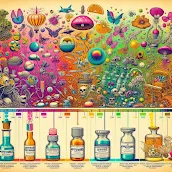A Brief History of Amphetamines
Rosenthal (2022) sums up this history:
- Ancient Origins: The use of amphetamines can be traced back to ancient China, where the herb Ephedra sinica (ma huang) was used to treat asthma and other respiratory ailments.
- Isolation and Synthesis: The active ingredient in ma huang, ephedrine, was isolated in the 19th century. In 1887, the synthetic compound amphetamine was created.
- Therapeutic Use: Amphetamine was initially marketed as a treatment for a variety of conditions, including asthma, narcolepsy, and depression.
- Abuse and Addiction: Despite its intended medical uses, amphetamine soon became popular for non-medical purposes leading to widespread abuse and addiction.
The Popularity of Amphetamines
Rosenthal (2022) points out that amphetamines have become more popular than cocaine in many parts of the world due to several factors:
- Potency and Duration: Amphetamines have a more potent and sustained effect than cocaine.
- Multiple Routes of Administration: Amphetamines can be taken orally, intravenously, or intranasally.
- Easy Synthesis: The precursors for amphetamine production are readily available, making it relatively easy to synthesize illicitly.
Types of Amphetamines
Amphetamine: The original form of amphetamine, often sold under the brand names Benzedrine and Dexedrine. Methamphetamine: A more potent form of amphetamine that is highly addictive. Synthetic Cannabinoids: A group of synthetic drugs that mimic the effects of cannabis but are often more potent and dangerous. (Rosental, 2022)
The Impact of Amphetamine Abuse
Amphetamine abuse can have severe consequences for both physical and mental health including (Rosenthal 2022):
- Heart problems: Increased heart rate, blood pressure, and risk of heart attack or stroke.
- Psychosis: Hallucinations, delusions, and paranoia.
- Addiction: Amphetamines are highly addictive, and withdrawal symptoms can be severe.
- Overdose: Overdosing on amphetamines can be fatal.
Efforts to Combat Amphetamine Abuse
Governments and healthcare organizations have implemented various strategies to address the amphetamine epidemic, including (Rosenthal 2022):
- Regulation of precursor chemicals: Laws have been enacted to restrict the sale of chemicals used to produce amphetamines.
- Treatment and prevention programs: Treatment programs and public health campaigns aim to reduce amphetamine use and addiction.
- Law enforcement efforts: Law enforcement agencies work to disrupt the production and distribution of amphetamines.
Despite these efforts, amphetamine abuse remains a significant public health challenge. it is important to raise awareness about the dangers of these drugs and to support individuals who are struggling with addiction.
References
- Rosenthal, M. S. (2022). Drugs: Mind, Body, and Society (2nd ed.). Oxford University Press Academic US. https://bookshelf.vitalsource.com/books/9780197585313






No comments:
Post a Comment